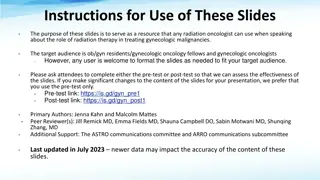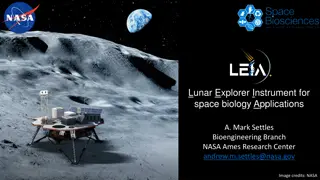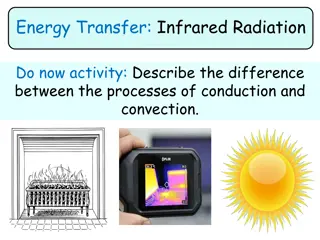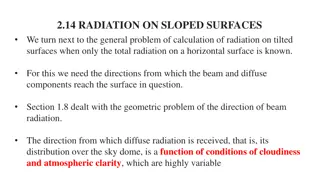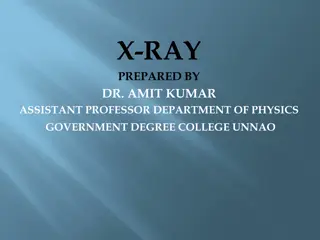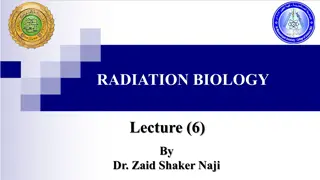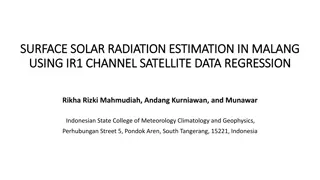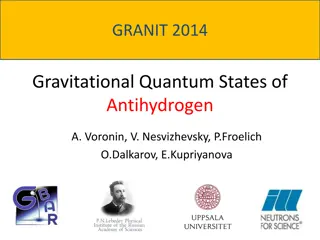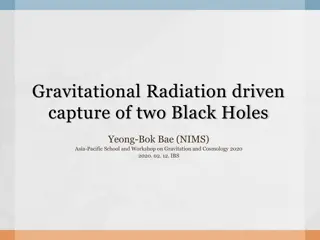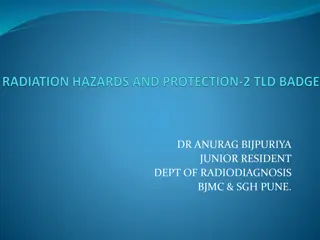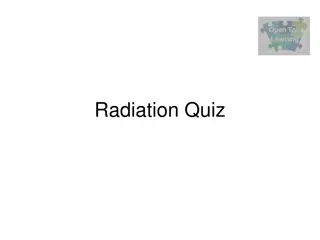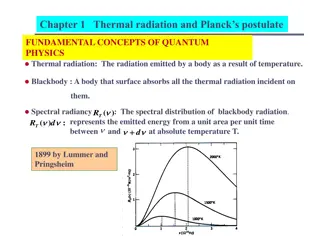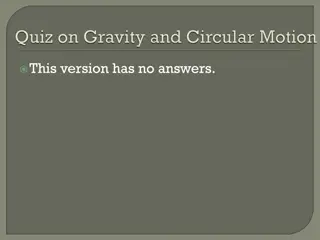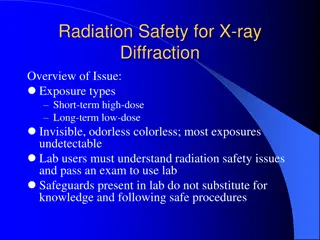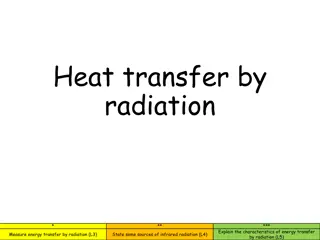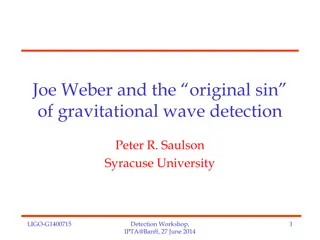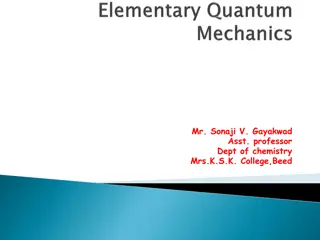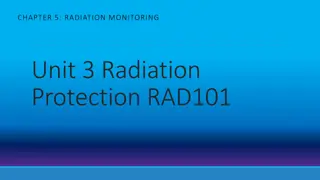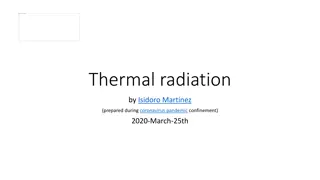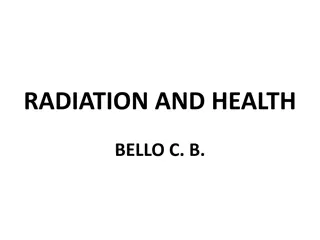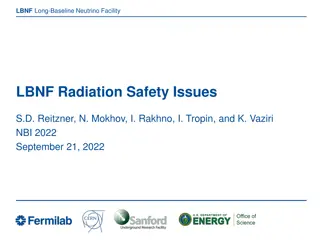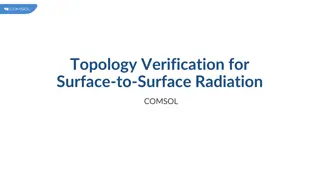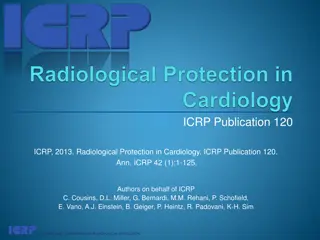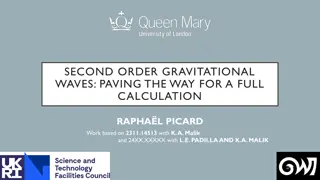Radiation Therapy for Gynecologic Malignancies - Comprehensive Overview
These slides serve as a valuable resource on radiation therapy for gynecologic malignancies. Key topics covered include radiation delivery techniques, indications for therapy, how radiation works, dosing considerations, and more. Suitable for radiation oncologists, ob/gyn residents, and gynecologic
14 views • 64 slides
Lunar Surface Radiation Risks and Mitigations Using Bioengineering
Lunar Explorer Instrument for space biology applications, LEIA Mission, addresses radiation health risks for crewed lunar exploration. The project aims to engineer yeast strains to study radiation sensitivity and identify genetic factors affecting cellular response. The instrument suite includes Bio
30 views • 8 slides
Radiation and Black Body Radiation in Astrophysics
Explore the concepts of radiation and black body radiation in astrophysics by analyzing the peak emissions of the Sun, Earth, and distant stars. Calculate black body radiation peaks, temperatures, and power outputs for various celestial bodies, as well as heat transfer rates in different scenarios.
1 views • 29 slides
Infrared Radiation in Energy Transfer Experiments
Explore the difference between conduction and convection, sources of infrared radiation, and how energy is transferred through radiation. Investigate how different surfaces emit varying levels of infrared radiation using a practical experiment with black and silver tins. Analyze and interpret result
2 views • 11 slides
Calculation of Radiation on Sloped Surfaces
The general problem of calculating radiation on tilted surfaces when only the total radiation on a horizontal surface is known involves determining the direction from which the beam and diffuse components reach the surface. Diffuse radiation models consist of three parts: isotropic, circumsolar, and
6 views • 15 slides
X-Ray Radiation: A Comprehensive Overview
X-ray radiation, discovered by Wilhelm Conrad Roentgen in 1895, is a high-energy electromagnetic radiation with a frequency range of 3.10^16Hz to 3.10^19Hz and a corresponding wavelength range from 0.01nm to 10nm. This form of radiation has applications in various fields, and its properties make it
7 views • 15 slides
Radiation Pollution and Its Effects
Radiation pollution, whether ionizing or non-ionizing, is a significant environmental concern. Ionizing radiation can penetrate tissues and cause damage to living cells, while non-ionizing radiation may effectively sterilize microbes. Sources of radiation include cosmic rays, terrestrial elements li
6 views • 15 slides
Radiation Pollution and Its Sources
Radiation pollution is a serious environmental concern caused by both ionizing and non-ionizing radiation. Ionizing radiation, such as alpha and beta particles and gamma rays, can lead to cellular damage, while non-ionizing radiation, like solar radiation, can also impact living organisms. Sources o
7 views • 15 slides
Biological Effects of Radiation in Radiation Biology Lecture
This lecture by Dr. Zaid Shaker Naji delves into the biological effects of radiation, including deterministic and stochastic effects. It covers mechanisms of damage at the cellular level, such as direct and indirect damage, and discusses somatic and genetic damages that can arise following exposure.
15 views • 10 slides
Estimation of Surface Solar Radiation in Malang Using Satellite Data Regression
Surface solar radiation estimation in Malang is conducted using IR1 channel satellite data regression. This study aims to fill the gap in radiation observation data by utilizing cloud top temperature measurements from IR imagery. The methodology involves determining radiation values based on atmosph
9 views • 13 slides
Gravitational Quantum States of Antihydrogen
The research delves into the intriguing realm of gravitational quantum states of antihydrogen, posing questions about the feasibility of gravitational mass extraction from these states. Through topics like spectroscopy, interference, and time-spatial resolution, the study sheds light on the properti
3 views • 21 slides
Gravitational Radiation Driven Capture of Black Holes in Clusters
Explore the dynamics of black hole binary formation in clusters, focusing on gravitational radiation-driven capture processes. Delve into the implications of gravitational wave emissions on orbit transitions and energy radiation. Discover critical impact parameters and approaches to understanding th
6 views • 21 slides
Radiation Detection and Dosimetry in Medical Imaging
Radiation detection and measurement are essential in radiology. Various instruments like ionization chambers, film badges, thermoluminescent dosimeters, and pocket dosimeters are used to monitor radiation exposure. Personnel dosimetry is crucial for tracking radiation doses over time to ensure safet
3 views • 31 slides
Test Your Knowledge with the Radiation Quiz!
Explore various questions related to radiation, lasers, lenses, x-rays, background radiation sources, and radiation protection measures in this engaging quiz. Test your understanding of these scientific concepts and learn new information along the way. Challenge yourself with multiple-choice questio
0 views • 26 slides
Thermal Radiation and Planck's Postulate: Fundamental Concepts of Quantum Physics
Thermal radiation is emitted by bodies due to temperature, with blackbodies absorbing all incident thermal radiation. Spectral radiancy of blackbody radiation indicates varying power with temperature and frequency. Stefan's law, Wien's displacement law, and classical theories like Rayleigh and Jeans
2 views • 16 slides
Concepts in Gravitational Forces and Celestial Bodies
This informative content delves into various concepts related to gravitational forces and interactions between celestial bodies like the Earth and the Moon. It covers topics such as the comparison of gravitational pulls, forces in concentric orbits, weight measurements in different scenarios, and th
4 views • 11 slides
Radiation Safety for X-ray Diffraction in Labs
Exposure to X-ray radiation in laboratories poses short-term high-dose and long-term low-dose risks, which are invisible and undetectable. Lab users must comprehend radiation safety principles, pass exams, and adhere to safe practices. Safety requirements include passing a radiation safety exam cove
2 views • 20 slides
Energy Transfer by Radiation and Infrared Sources
Explore the characteristics of energy transfer by radiation, learn how to measure this transfer, discover sources of infrared radiation, and understand the effects of surface properties on absorption and emission. Find out why dark surfaces absorb more radiation, how objects emit and absorb infrared
2 views • 28 slides
The Legacy of Joe Weber in Gravitational Wave Detection
Joe Weber, a key figure in the history of gravitational wave detection, made significant original contributions to the field, despite facing conflicts and challenges. His groundbreaking work laid the foundation for future advancements in the detection of gravitational waves. The story of Joe Weber's
1 views • 19 slides
Black Body Radiation: Key Concepts and Applications
Black body radiation is a fundamental concept in physics, with theoretical black bodies absorbing all radiation. While no material is a perfect black body, carbon comes close. This radiation curve demonstrates energy emission at different wavelengths, influenced by temperature variations. Stars serv
0 views • 13 slides
Radiation Monitoring and Personnel Dosimetry: A Comprehensive Guide
This chapter delves into the importance of personnel dosimetry in radiation protection, covering topics such as dosimeter placement, types of dosimeters, radiation survey instruments, and calibration tools. It highlights the necessity for monitoring radiation exposure regularly to ensure safety with
2 views • 59 slides
Thermal Radiation and its Effects
Thermal radiation, studied by Isidoro Martínez during the COVID-19 pandemic, explores the transfer of heat through conduction, convection, and radiation. It delves into the concept of thermal effects of radiation, blackbody radiation, and related laws like Planck's law, Stefan-Boltzmann's law, and
3 views • 23 slides
Radiation and Its Effects on Health
Radiation is a form of energy that can be emitted from radioactive materials in the form of particles or waves. It can be either ionizing or non-ionizing, with ionizing radiation having the ability to penetrate tissues and deposit energy within them. While alpha particles, beta particles, x-rays, an
3 views • 38 slides
LBNF Radiation Safety Issues Overview
The Long-Baseline Neutrino Facility (LBNF) addresses radiation safety issues through various components such as prompt radiation, residual radiation, activated air release, and ground water protection. Detailed modeling parameters using MARS for radiological safeguards are discussed, along with prom
4 views • 17 slides
Surface-to-Surface Radiation Verification and Boundary Detection in COMSOL
Explore the verification of surface-to-surface radiation setups in COMSOL, detecting incorrect radiation configurations with nonradiating boundaries. Learn how to identify and resolve nonradiating boundaries, ensuring accurate and effective radiation simulations. Discover the importance of selecting
7 views • 10 slides
Radiation Protection in Cardiology: Guidelines for Patient Safety
Patient radiation exposure in cardiac procedures, particularly in nuclear medicine, CT scans, interventional cardiology, and electrophysiology, can lead to skin injuries and increased cancer risk. It is crucial for healthcare providers to be aware of radiation risks, follow professional guidelines,
3 views • 25 slides
Radiation
Radiation is the energy particles or waves emitted from radioactive elements, involving the atom's nucleus. Learn about nuclear radiation, isotopes, radioisotopes, ionizing and non-ionizing radiation, and types of ionized radiation like Alpha Radiation. Explore the concepts of mass number, atomic we
5 views • 38 slides
Radiation Therapy
Radiation therapy is a vital tool in cancer treatment, aiming to maximize tumor damage while minimizing harm to normal tissue. Different methods are used, such as surgery, radiation therapy, and chemotherapy drugs. The success of radiotherapy depends on factors like cancer type, the skill of the rad
1 views • 16 slides
Gravitational Fields
Delve into the intricate world of gravitational fields as you explore the concepts and phenomena associated with this fundamental force. Understand how mass influences the space around it, creating the gravitational field that governs the motion of objects. Discover the significance of gravitational
11 views • 9 slides
Revealing Scalar-Induced Gravitational Waves: A Detailed Analysis
Exploring the realm of second-order gravitational waves in the context of perturbation theory, this work delves into the intricate calculations and implications of scalar-induced gravitational waves during radiation domination. The study investigates the direct link between inflation, smallest scale
3 views • 31 slides
Radiation Sources and Types
Radiation comes in various forms such as electromagnetic radiation, non-ionizing radiation, ionizing atomic particle radiation, X-rays, gamma rays, cosmic rays, and more. It is important to be aware of common sources like television, natural gas, and consumer products, which contribute to our daily
1 views • 19 slides
Advancements in Radiation Oncology and Biology Research Projects
Explore the comprehensive research projects in radiobiology, clinical radiation oncology, and applied radiation biology undertaken by the International Atomic Energy Agency. Discover randomized clinical trials, evidence-based assessments, and innovations in radiation therapy planning for better pati
0 views • 5 slides
Mass Dynamics and Inertia in Gravitational Fields
Explore the fascinating relationship between mass dynamics, inertia, and gravitational fields in this informative content. Delve into the nature of inertia, dynamic gravitational fields, and the concept of force fields for electric charge and mass. Discover how mass and gravitational forces interact
4 views • 17 slides
Gravitational Potential Energy
Gravitational potential energy is the energy an object possesses due to its position in a gravitational field. It is defined by the work done per unit mass in moving an object from infinity to a specific point. This energy plays a crucial role in understanding the behavior of objects subject to grav
4 views • 14 slides
Understanding Gravitational Potential Energy Conversions
Explore the concept of gravitational potential energy and its conversion to kinetic energy through engaging examples and practical applications. Learn about the equation for gravitational potential energy, its relationship with height and mass, and how energy transformations occur during objects' mo
3 views • 10 slides
Nuclear Parameter Estimation from Gravitational Waves Research
Explore the latest findings on nuclear systems, neutron stars, gravitational waves, and more. Discover the implications of gravitational waves on neutron star behavior and the equation of state. Dive into cutting-edge research on nuclear parameters estimation through gravitational wave analysis.
0 views • 21 slides
Understanding Ionizing Radiation Effects
Ionizing radiation, with its damaging effects on DNA, has a significant impact on cell reproduction and is particularly effective in targeting rapidly reproducing cancer cells. The biological effects of ionizing radiation are directly proportional to the dose in rads and depend on the type of radiat
4 views • 5 slides
Effects of Nuclear Radiation on Physical and Biological Systems
Explore the nature and sources of nuclear radiation, including ionizing radiation emitted by unstable atoms. Discover the impact of natural and artificial exposure to radiation on human health, with insights from the National Council on Radiation Protection and Measurements. Learn about cosmic radia
5 views • 49 slides
Understanding Gravitational Fields
Learn about gravitational fields and the universal law of gravitation, how vectors represent gravitational fields, the concept of gravitational field strength, and its significance in physics. Explore the relationship between massive objects, attractive forces, and the field's influence on space.
1 views • 9 slides
Experimenters' Regress: Detecting Gravitational Radiation Insights
Delve into Harry Collins' examination of detecting gravitational radiation, exploring the Weber Bar's role, challenges faced in detecting gravitational waves, and the innovative approaches taken. The analysis encompasses the skepticism, experimental replications, and the profound impact on scientifi
3 views • 22 slides
